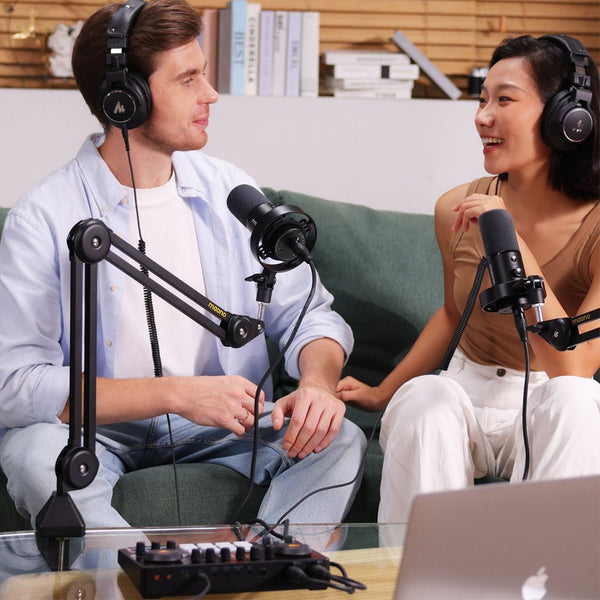Are you a beginner at baking? Have you ever wondered about the difference between baking a cupcake and a muffin? Let’s find out.
When it comes to baking, few treats spark as much debate as muffins and cupcakes. They may look similar, both baked in tins and wrapped in liners, but their flavors, textures, and purposes couldn’t be more distinct. While muffins lean toward hearty and wholesome, cupcakes are crafted to be sweet and indulgent.
However, in today’s digital world, baking isn’t just about making delicious food—it’s also about sharing your creations online. More bakers are turning to video tutorials, where a wireless microphone or the best Lavalier lapel microphone helps deliver clear, professional voiceovers. Whether you’re walking viewers through mixing muffin batter or demonstrating perfect cupcake frosting, using a microphone lapel ensures your audience hears every step clearly.
This guide combines two worlds—baking know-how and voiceover tech—to help you not only master muffins vs. cupcakes but also record tutorials with pro-quality sound.

Muffins vs. Cupcakes: The Differences in Ingredients and Techniques
At first glance, muffins and cupcakes seem interchangeable, but their core ingredients set them apart:
-
Muffins use less sugar and fat, often incorporating whole wheat flour, fruit, nuts, or savory add-ins like cheese. They are closer to quick breads in composition.
-
Cupcakes are essentially miniature cakes—sweeter, lighter, and almost always frosted. They rely on butter, sugar, and eggs for a fluffy crumb.
Techniques also differ:
-
Muffins follow the muffin mixing method: dry and wet ingredients are mixed separately, then gently combined to avoid overmixing.
-
Cupcakes are prepared with the creaming method: beating butter and sugar together first to incorporate air, producing a lighter texture.
In short, muffins are hearty and practical, while cupcakes are decadent and decorative.
How Mixing Methods Affect the Texture of Muffins vs. Cupcakes
The mixing method plays a huge role in texture:
-
Overmixing muffin batter leads to tough, dense baked goods with tunnels inside. The goal is a slightly coarse crumb with a domed top.
-
Cupcakes, on the other hand, require more thorough mixing to achieve their soft, fine crumb. Proper aeration during creaming creates cupcakes that rise evenly and feel delicate on the palate.
This is why muffins work well for breakfast, while cupcakes shine at parties and celebrations.
Baking Tools Every Beginner Needs for Muffins and Cupcakes
Whether you’re team muffin or team cupcake, having the right tools makes baking smoother:
-
Muffin/Cupcake tin – A nonstick 12-cup pan is essential.
-
Paper liners – Prevent sticking and make cleanup easier.
-
Mixing bowls – At least two for separating wet and dry ingredients.
-
Whisk and spatula – For blending without overmixing.
-
Hand mixer or stand mixer – Particularly useful for cupcakes that require creaming.
-
Cooling rack – Prevents sogginess by allowing air circulation.
Optional extras include a piping bag for frosting cupcakes and a cookie scoop for evenly portioned muffin batter.
Common Mistakes in Baking Muffins vs. Cupcakes and How to Fix Them
Even seasoned bakers make mistakes. Here are a few common issues and solutions:
-
Dense muffins: Likely from overmixing. Stir batter gently until just combined.
-
Cupcakes sinking in the middle: Oven temperature may be too low, or batter overbeaten. Use an oven thermometer and follow mixing instructions closely.
-
Dry muffins or cupcakes: Overbaking is usually the culprit. Remove them as soon as a toothpick comes out clean.
-
Uneven rising: Be sure ingredients are at room temperature, and don’t skip preheating the oven.
Tips for Perfecting Cupcake Frosting vs. Muffin Toppings
One of the biggest differences lies in finishing touches:
-
Cupcakes almost always feature frosting—classic buttercream, cream cheese, or ganache. To achieve bakery-level results, use a piping bag with decorative tips.
-
Muffins typically don’t need frosting but shine with toppings like streusel, oats, or a glaze drizzle. For savory muffins, shredded cheese or seeds add visual appeal.
Think of muffins as rustic and hearty, while cupcakes are polished and celebratory.
Using a Wireless Microphone to Record Baking Tutorials at Home
Baking is visual, but audio is just as important when teaching others. Imagine explaining the muffin mixing method, but your viewers hear only muffled sounds over the whir of your mixer. That’s where wireless microphones and a professional lapel microphone come in.
A lapel mic allows you to move freely around the kitchen without being tethered by cables. You can measure, stir, and decorate while speaking naturally, and the mic captures your voice clearly. If you’re just starting out, choosing the best lapel mic will elevate your tutorials, making them sound as polished as your baked creations.
Two excellent recommendations for baking creators are:
-
Maono Wave T5 Wireless Microphone
-
The Maono Wave T5 is compact, lightweight, and designed for content creators.
-
Offers reliable transmission with minimal delay, making it perfect for real-time kitchen tutorials.
-
Long battery life ensures uninterrupted recording sessions.
-
Maono Wave T1 Mini
-
Maono Wave T1 Mini is affordable yet powerful, ideal for beginners starting their YouTube or TikTok baking journey.
-
Easy to connect to smartphones and cameras.
-
Delivers crisp sound quality that cuts through background kitchen noise.
These mics, along with a good lapel mic, help elevate your baking videos from amateur to professional, letting your audience focus on your instructions—not on poor audio.
FAQ Section about Baking
1. What are the main ingredient differences between muffins and cupcakes?
Muffins use less sugar and fat, with heartier ingredients like fruit or whole grains, while cupcakes are sweeter and rely on frosting for finishing.
2. Why are muffins usually less sweet than cupcakes?
Muffins are intended as breakfast or snack foods, closer to quick breads, while cupcakes are mini desserts.
3. Do muffins always use the “muffin mixing method”?
Yes, the traditional method involves mixing wet and dry ingredients separately, then combining with minimal stirring.
4. Can you frost muffins like cupcakes, or is it just a cupcake thing?
You can frost muffins, but it makes them more like cupcakes. Typically, muffins stick to streusel, glazes, or savory toppings.
5. How does baking time differ for muffins vs. cupcakes?
They’re usually similar (18–22 minutes), but muffins may need slightly longer due to denser batter.
6. Why do muffins often have a dome top while cupcakes are flat?
The muffin mixing method encourages quick steam release, creating a domed top. Cupcakes rise more evenly due to creaming.
7. What are the healthiest substitutions for muffins compared to cupcakes?
You can swap whole wheat flour, Greek yogurt, or honey into muffins. Cupcakes rely on structure from sugar and butter, making them harder to lighten.
8. Can I use the same pan for both muffins and cupcakes?
Yes, a standard muffin/cupcake pan works for both. Just adjust baking time based on recipe.
9. How do I prevent muffins from being too dense?
Don’t overmix. Stir only until you no longer see dry flour streaks.
10. Are savory muffins considered closer to bread than cupcakes?
Yes, savory muffins (cheese, spinach, bacon) align more with quick breads than with cupcakes.
Wireless Mic FAQs for Baking Videos
11. What type of wireless microphone is best for recording in a kitchen?
A lavalier (clip-on) wireless mic is best since it stays close to your mouth and cuts out background noise.
12. How do I connect a wireless mic to my camera or phone for baking tutorials?
Most wireless mics, like the Maono Wave T5 or T1 Mini, include a receiver that plugs directly into your phone or camera’s audio jack or USB-C/Lightning port.
13. Is a lavalier mic better than a headset mic for cooking videos?
Yes, lavaliers are discreet and less intrusive on camera, making them perfect for tutorials.
14. How do I avoid picking up oven or mixer noise in my voiceover?
Position the mic close to your chest and use noise reduction features available in editing software.
15. Can I record live narration while baking, or should I add voiceover later?
Both work, but live narration feels more authentic. A wireless mic makes this easier since it picks up your voice clearly while you move.
16. How do I sync my wireless mic audio with my baking video?
Clap once before recording. The clap creates a visual and audio cue you can align during editing.
17. What’s the ideal mic placement when moving around the kitchen?
Clip the mic to your collar or apron about 6–8 inches from your mouth.
18. Do I need a pop filter if I’m wearing a wireless lavalier mic?
Not usually, but a small foam windscreen can help reduce plosives and background noise.
19. How long does a wireless mic battery last when recording baking content?
Most modern wireless mics last 6–8 hours on a charge, enough for several tutorials.
20. What’s the best budget-friendly wireless mic for baking YouTube videos?
The Maono Wave T1 Mini is a great starter option—compact, affordable, and easy to set up.

Conclusion
Muffins and cupcakes may share a pan, but their differences in ingredients, techniques, and textures make each unique. Muffins offer hearty, rustic satisfaction, while cupcakes deliver sweet, frosted indulgence.
And if you’re sharing your baking passion online, pairing your creations with clear, professional audio is essential. Whether you opt for the best Lavalier lapel microphone or a professional lapel microphone, the right lapel mic will ensure your tutorials sound as good as they look. A reliable wireless system like the Maono Wave T5 or T1 Mini ensures your audience hears every whisk, stir, and tip without distraction.
Whether you’re baking for family, friends, or followers, mastering both the treats and the tech will help you rise to the occasion—just like a perfectly domed muffin.



